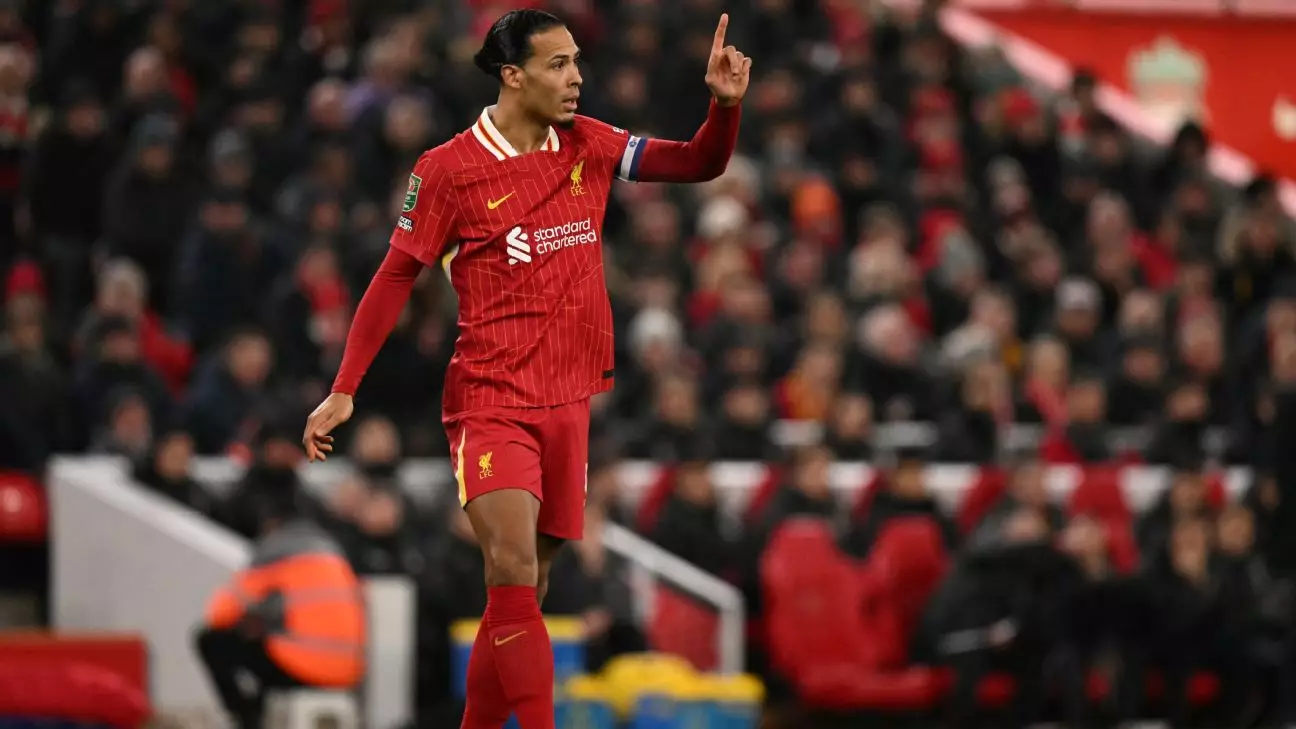Liverpool’s recent triumph over Tottenham Hotspur was not just a display of skill but an exhibition of tactical prowess. The 4-0 victory at Anfield not only secured a place in the Carabao Cup final but also left room for introspection, especially from the Reds’ captain, Virgil van Dijk. Despite the resounding scoreline, van Dijk’s reflections highlighted an important narrative about the expectations of performance, even in victory.
From the outset, Liverpool established their dominance, showcasing an aggressive and high-pressing style of football that left Tottenham seemingly unable to cope. Goals from Cody Gakpo, Mohamed Salah, Dominik Szoboszlai, and Van Dijk himself illustrated Liverpool’s attacking depth and versatility. However, the stark reality was that Spurs, under the guidance of manager Ange Postecoglou, failed to register a single shot on target throughout the match. This situation raises questions not just about Tottenham’s performance but about how Liverpool’s tactical execution forced the opposition into submission.
Van Dijk’s post-match comments revealing his dissatisfaction with the team’s first-half intensity are noteworthy. His acknowledgment that Liverpool could have exerted more pressure on Spurs suggests an underlying player mentality—one that prioritizes continuous improvement and perfection in performance, regardless of the scoreboard. This perspective reinforces the ethos of a successful team; even in dominating victories, players must push for greater achievements.
What makes van Dijk’s remarks particularly compelling is their reflection on leadership. In a world where athletes often celebrate wins without reservation, van Dijk’s insistence on demanding more from his teammates demonstrates a commitment to excellence. His comment about the lack of momentum in the first half due to interruptions speaks to a larger issue commonly faced in football—disruptions can break concentration and fluidity, making it essential for players to find ways to adapt.
Van Dijk emphasized the need for a “complete performance,” underscoring the reality that while conventional metrics like goals matter, the process and execution of a game are equally important. It is this mentality that instills a culture of high standards within the team, which presumably plays a role in Liverpool’s consistent title challenges across competitions.
Liverpool’s emphatic win also keeps their hopes of a historic quadruple alive, as they lead the Premier League and await critical fixtures in both the Champions League and FA Cup. Their next challenge will be against Championship side Plymouth Argyle in the FA Cup, a match that could test their resolve and squad depth. The pressure to succeed is palpable, and the mindset van Dijk advocates will be crucial as Liverpool navigates the demands of their schedule.
Furthermore, with the Carabao Cup final on the horizon against Newcastle, maintaining intensity and focus will be essential. Slot’s remarks regarding the players’ work rate without the ball reinforce that Liverpool is not merely relying on their attacking talents but also honing their defensive capabilities to stifle opponents. This balanced approach is vital as they aim for silverware on multiple fronts.
Ultimately, the interplay between a dominant display and an overarching sense of dissatisfaction encapsulated by van Dijk’s critique provides a valuable lesson in consistency. Teams that become complacent after victories can fall prey to underperformance in crucial moments. By demanding higher standards, Liverpool not only positions itself favorably for future contests but also embarks on a journey marked by continuous growth and resilience.
While Liverpool’s performance against Tottenham was a testament to their capabilities, the insights shared by van Dijk illuminate the complexities of elite sport, where learning and adaptation are just as crucial as victories. As Liverpool gears up for further challenges, their commitment to improvement could be the cornerstone of their success this season.

